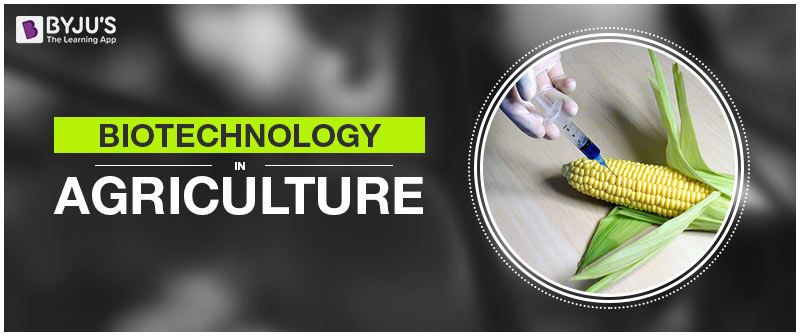Biotechnology is an emerging field of research as it has the potential to solve many biological problems which have not been solved until now with the conventional techniques. Biotechnology extends its applications over a broad spectrum which includes medicines, agriculture, transgenic, genetic engineering, etc. Here we will discuss biotechnology in agriculture.

Biotechnology in Agriculture
The large increase in the size of a population has led to an increasing demand for resources and basic requirements such as food, shelter, clothing, etc. Another impact of the increase in population is the exploitation of the land for crops production. Thus cultivation has been limited to a small area. In order to meet the demands with limited resources, we need to apply a great effort. Biotechnology in agriculture has changed the face of this condition.
Biotechnology is the use of technology to modify or manipulate any biological system or living system for the development or improvement of products for various purposes. It is widely employed in different fields and agriculture is one among them. Researchers have suggested different options for increasing food production. Genetically engineered crop-based agriculture is an option, others being agrochemical based agriculture and organic agriculture.
The green revolution was an initiation for increasing food production but it couldn’t meet the growing demands. Later the idea of crop variety improvement program was put forward. However, the agrochemicals seem to be unfeasible for farmers. In addition, the environmental issues related to them also reduced their use.
Genetically Modified Crops
Genetically modified crops (GMO) are the latest advancement in the agricultural field. These crops result from the alteration in the genetic makeup of the crops. This modification leads to a number of advantages in the crops which include –
- There is less loss after harvest.
- The crops can be modified to have additional nutrients value for human welfare.
- These crops are modified to be highly efficient, i.e, the high yield with less usage of minerals.
- The decrease in the use of insecticides and pesticides which lead to pollution in the environment.
- More tolerance to the natural stresses like natural calamities, extreme temperature and weather conditions, lack of water and minerals.

One of the most common examples is that of Bt Cotton. Bt stands for Bacillus thuringiensis which, when introduced in plants develop resistance against pests like bollworms and corn borer. Thus, genetically modified crops help in optimizing the complete process of agriculture. Advancement of biotechnology in agriculture resulted in a variety of GMO which include pest-resistant plants, disease-resistant plants, etc.
For more information about the role of biotechnology in agriculture, visit BYJU’S.

Comments